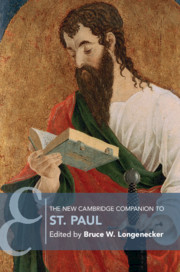Book contents
- The New Cambridge Companion to St. Paul
- Cambridge Companions to Religion
- The New Cambridge Companion to St. Paul
- Copyright page
- Dedication
- Contents
- Map
- Contributors
- Abbreviations
- Part I Paul, Letters and Communities
- Part II The Pauline Letter Collection
- Part III Paul’s Theological Discourse
- 9 What Did Paul Think Is Wrong in God’s World?
- 10 What Did Paul Think God Is Doing about What’s Wrong?
- 11 What Did Paul Think God Is Doing in Christian Communities?
- 12 How Did Paul Read Scripture?
- 13 Did Paul Abandon either Judaism or Monotheism?
- 14 Why Were People Attracted to Paul’s Good News?
- 15 How Was the Reception of Paul Shaped in the Early Church?
- 16 What Makes Paul Challenging Today?
- Bibliography
- Index of Biblical and Ancient Writings
- Index of Modern Scholars
- Cambridge Companions to Religion (continued from page iii)
- References
16 - What Makes Paul Challenging Today?
from Part III - Paul’s Theological Discourse
Published online by Cambridge University Press: 19 June 2020
- The New Cambridge Companion to St. Paul
- Cambridge Companions to Religion
- The New Cambridge Companion to St. Paul
- Copyright page
- Dedication
- Contents
- Map
- Contributors
- Abbreviations
- Part I Paul, Letters and Communities
- Part II The Pauline Letter Collection
- Part III Paul’s Theological Discourse
- 9 What Did Paul Think Is Wrong in God’s World?
- 10 What Did Paul Think God Is Doing about What’s Wrong?
- 11 What Did Paul Think God Is Doing in Christian Communities?
- 12 How Did Paul Read Scripture?
- 13 Did Paul Abandon either Judaism or Monotheism?
- 14 Why Were People Attracted to Paul’s Good News?
- 15 How Was the Reception of Paul Shaped in the Early Church?
- 16 What Makes Paul Challenging Today?
- Bibliography
- Index of Biblical and Ancient Writings
- Index of Modern Scholars
- Cambridge Companions to Religion (continued from page iii)
- References
Summary
In his robust and polarizing style, Paul makes claims that have provoked readers in numerous ways, at times spurring admirers to follow daring paths with radical implications for theology, but sometimes irritating his critics, who have raised numerous objections on theological, philosophical, and moral grounds. Paul divides opinion as much today as he did in his own lifetime. This essay discusses five topics where Paul proves to be challenging. In each case, we will trace how Paul subverts some aspects of an ancient value-system, not by a straightforward inversion of values but by his reconfiguration of what is good and necessary around the event of Christ crucified and risen. In many cases we will find that there is a partial match between Paul’s Christological configuration of values and the liberal values espoused by the majority of intellectuals in the modern West, with respect to justice, equality, freedom, and human rights. If Paul is to remain in any sense a constructive challenge, we will need to deploy a creative theological hermeneutic, which attempts to recontextualize Paul’s core insights in our own very different historical, intellectual, and social setting.
- Type
- Chapter
- Information
- The New Cambridge Companion to St. Paul , pp. 299 - 318Publisher: Cambridge University PressPrint publication year: 2020



